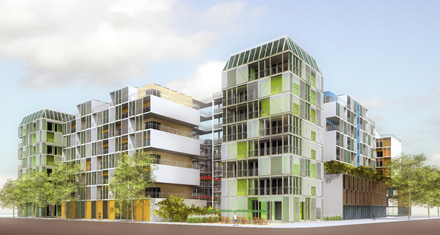With an eye toward energy efficiency, it is essential to design dwellings that are able to help occupants manage their consumption and production given than at least 65 % of electric consumption concerns the building sector. “In fact, the main contributors to management of the grid are the inhabitants of the buildings”, explains Stéphane Ploix, researcher at GSCOP. “The goal is to have consumers become actors in the system and to this end they must be able to have an accurate idea of the consequences of each action in terms of the energy impact and in particular that impact on the power grid.”

Following the success of the Rhône-Alpes team in the Solar Decathlon 2012 with its Canopea project, the launch of the Smart-Energy core project is geared towards structuring research activity around energy and information technology on the Grenoble site. The goal of Smart-Energy which involves G2ELab, G-SCOP, GIPSA-lab and LIG is to bring together the stakeholders in Grenoble who have an interest in the Smart-Grid and Smart-Homes so as, on the one hand, to better integrate buildings in the power grids and, on the other hand, to involve the occupants/users of buildings in the energy challenge. To this end, energy consumption must be made transparent through persuasive interfaces. “We have already developed calculations with unclear results given that they were supplied in curves.” Researchers, in conjunction with the LIG, are working on a qualitative representation of the building in order to transform the information and develop mirror interfaces. “What will be the consequences in terms of energy expenditure if I open a window or if I throw a pot of hot water in the sink? » The answer lies both in the physics and in the nature of interactions with the occupants/users. A tablet-based application has already been developed with VestaSystem which offers advice to consumers and work is now continuing within the context of Equipex Amiqual4Home.

Following the success of the Rhône-Alpes team in the Solar Decathlon 2012 with its Canopea project, the launch of the Smart-Energy core project is geared towards structuring research activity around energy and information technology on the Grenoble site. The goal of Smart-Energy which involves G2ELab, G-SCOP, GIPSA-lab and LIG is to bring together the stakeholders in Grenoble who have an interest in the Smart-Grid and Smart-Homes so as, on the one hand, to better integrate buildings in the power grids and, on the other hand, to involve the occupants/users of buildings in the energy challenge. To this end, energy consumption must be made transparent through persuasive interfaces. “We have already developed calculations with unclear results given that they were supplied in curves.” Researchers, in conjunction with the LIG, are working on a qualitative representation of the building in order to transform the information and develop mirror interfaces. “What will be the consequences in terms of energy expenditure if I open a window or if I throw a pot of hot water in the sink? » The answer lies both in the physics and in the nature of interactions with the occupants/users. A tablet-based application has already been developed with VestaSystem which offers advice to consumers and work is now continuing within the context of Equipex Amiqual4Home.





